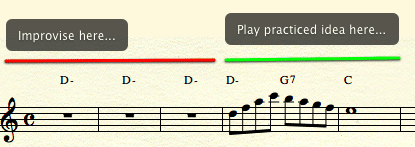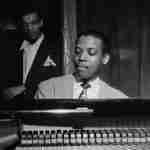If jazz is all about being in the moment, but all our practice time is dedicated to figuring out what we want to play when we perform, then how are we supposed to be in the moment when we perform? There’s this strange dichotomy…
On one side, jazz improvisation is very rehearsed. And on the other, it’s very spontaneous. In between these two sides is a ginormous gray area. It’s this gray area in the middle where people get lost.
Trust the process
Jazz is about being in the moment. Like Herbie says, it’s not about playing what you’ve practiced, it’s about here. Now. This moment. That’s what jazz is.
But, why are our efforts in the practice room so thought out, so calculated, so uninspired, when we’re trying to achieve something on stage that sounds as though it were created in the moment?
It seems counter-intuitive: rehearse concepts and language over and over with the goal of improvising in the moment when you perform. Because this sounds so counter-intuitive, most people do not practice this way. They assume that because they are trying to conjure up a purely improvised performance, they should practice this way as well.
This could not be further from the truth. The process of achieving successful results in jazz improvisation is thought-out, repetitive, and slow. As you will read later, there are infinite ways to instill plenty of creativity and spontaneity into this seemingly dry process, which will help better prepare you for the pure improvisatory state of playing the moment.
Trust the process.
Be over-prepared and let go
To be in the moment and play the moment so to speak, you must be over-prepared. This means knowing all the material you’re going to perform inside and out.
Your goal is not to be mediocre.
To be better than mediocre, you not only need to be prepared, you need to be over-prepared. If you are over-prepared, the creative genius inside you will have the opportunity to arise in the very moment of performance.
What does it mean to be over-prepared? It means you’re uber confident with the material you’re performing. You know and can sing all the melodies. All the chord progressions make logical sense to you and you’ve applied language to them. You’ve worked on any “high-maintenance” areas of the tunes, giving them the special attention they deserve so you’re fluid on these more difficult sections.
And you’ve made a personal connection to what you’re performing. Frequently we forget about this subtle yet important step. To actually connect to and enjoy what we’re playing, thereby allowing it to be a vehicle for our own personal expression. Yes, you should actually like the tunes you’re performing and you should work diligently to develop this connection with each piece you’re performing. The audience can always tell if you’re into it.
To play the moment, not only do you have to be over-prepared, you need to let go, allowing the present moment to affect what happens.
To let go, you have to be willing to fall flat on your face. In fact, that’s the reason you don’t let go: because you’re afraid of screwing up. In a recent interview with Keith Jarrett, he spoke to this very point:
“But you have to be ready to fall on your face — flat on your face — and have failed miserably…like Jennifer Beals in Flashdance: She falls over; it’s her worst nightmare come true. But what can you do worse than that if you’re dancing? The same with this.”-Keith Jarrett
Keith Jarrett is referring to a recent solo concert which was completely improvised. He claims to have had no idea prior to performing what might happen. This situation could be disastrous for him, but instead, he produced some amazingly beautiful music.
He’s capable of this because he’s practiced countless hours, over-preparing himself for virtually any musical situation, even one where he is to create purely improvised melodies, progressions, and solos, all by himself. These notes do not come out of thin air. He has a deep well of knowledge to draw from, built up from years of practice.
But then, he’s not afraid to let go completely, let the moment take over, and see what happens. He can play the moment because he’s over-prepared and not afraid of falling flat on his face.
Integrate a performance mindset into your practice
It is possible to integrate a performance mindset into your practice without mindlessly improvising chorus after chorus with a play-along track. This is the ginormous gray area I’m talking about. It’s not black and white. You don’t always have to operate in “practice-mode” or “performance-mode,” but rather could choose to explore the gray area in between.
There are, of course, reasons you would want to be at one of these extremes: when you perform you’ll want to aim to be in complete “performance-mode,” and when you’re introducing a brand new idea into your playing concept, you may wish to be in complete “practice-mode,” so do not discount either of these states. Simply realize that there is a whole lot of ground in between them to explore.
Mixing improvising with language or concepts
To start exploring this gray area, be very deliberate in the way you combine a performance mindset and a practice mindset. For example, it could be very thought out: I’m going to improvise three bars, and then I’ll play this line over these chords. Simple.
It would look something like this:
By mixing pure spur of the moment improvisation with an idea you’ve worked out, you start to work the idea into your concept. Gradually, you’ll learn how to improvise using part of the line, the shape of the line, or just a loose idea of it, all subconsciously. The goal is that these new pieces of language become something that would naturally arise because you start to hear them (or pieces of them) in the moment…which brings us to our next point…
Improvising with practiced ideas arising naturally
Suppose you’re working on an a piece of language like the one in the previous example and you’ve played it dozens of times in all keys. You don’t have to think about it. It’s effortless. And then after that, perhaps you applied that language to a tune. So you know this idea pretty well…
Now, improvise over a tune with a clear mind, listening intently to what you hear in your mind. Aim to play what you hear.
But, keep that idea in the very back of your mind, and when you hear it or a piece of it, let it come out. The goal is not to force it, but to let it naturally arise while you improvise. It seems a bit esoteric at first, just improvising, yet slightly thinking about an idea. Just give it a try. You’ll soon understand that once you’ve worked on an idea or concept, that just holding a slight feeling of the idea in your mind while you improvise, it will easily appear.
As you do this with an idea more and more, it will begin to naturally arise all the time, and it will sound like it’s created in the moment because you’ll be hearing it in the moment.
Think about it. Bird played a lot of the same lines all the time, but they always sounded fresh, every time he played them. Why?
They sounded fresh every time because he was hearing those particular lines in that particular moment. That’s the key.
Simulating performance
Set some time aside everyday where you pretend you’re performing.
Try to get people to listen to you, or play where you know people can hear you. This may bother them, but just tell them you’re practicing performing.
But seriously, all joking aside, it’s great to play in front of people, even if it’s your mother. Playing when you know other people are listening completely changes your mindset. Adjusting to this mindset and bringing yourself back to your center where you feel focused, confident, and creative is essential.
Getting used to playing in front of people will help you transition to a performance mindset, and help you be in the moment when you perform, not letting your nerves ruin your ability to play the moment.
Jazz is the moment
Here. Now. Right now. This very moment. That’s what this music is about. Not yesterday, not tomorrow. It’s about now. Coming to this realization is quite scary. You could fall flat on your face. But that’s okay. It happens to everyone. Prepare more the next time and do it again.
Trust the process, be over-prepared but let go, and start to integrate a performance-mindset into your practice regimen. Be confident and play the moment.











